Physical Activity for Older Adults
Medically reviewed by Drugs.com. Last updated on May 6, 2024.
What do I need to know about physical activity and aging?
Physical activity can help you get or stay physically and mentally healthy as you age. You may be able to do your daily activities more easily. If you have arthritis, your joints may move more easily and with less pain. Your bones and muscles will get stronger. Strength and better balance help prevent osteoporosis and reduce your risk for falls. Regular activity can improve your mood and appetite, and help you sleep better. Your risk for diseases such as cancer, heart disease, diabetes, and stroke will be lower. Activity can help you control your blood pressure and blood sugar levels, and lower your cholesterol. Activity can also slow or prevent cognitive (thinking) problems as you age.
What do I need to know about physical activity safety?
- Talk to your healthcare provider before you start doing physical activities. Your provider will check your general health. He or she may recommend you avoid certain activities based on your health. He or she will also make sure your physical activity plan works with any medicines you are taking. Some medicines can make you sleepy or cause balance problems. These can make certain physical activities less safe.
- Start slowly and work up to more activity. It is important not to become highly active too quickly. Your body will need time to adjust. For example, you can cause serious injury if you try to lift a weight that is too heavy. Your healthcare provider can help you create a plan. The plan may start with a few minutes of physical activity on certain days of the week. You can add activities slowly over time. This may include making sessions longer, or being active on more days of the week. You can also add more weight as you get stronger.
- Do a variety of activities throughout the week. Do conditioning, strength training, flexibility, and balance activities. General guidelines are included below for how much of each activity to get. Your healthcare provider or physical therapist may give you specific instructions to follow.
- Stretch before and after you do any conditioning or strengthening activities. You can also do stretching activities on days you do not do any other kind of activity.
- Move slowly and smoothly. Avoid fast or jerky motions to help prevent an injury.
- Do exercises and stretches on both sides. This helps the muscles on both sides remain strong and flexible.
- Stop if you feel sharp pain or an increase in pain. Stop the exercise and contact your healthcare provider if you have these symptoms. It is normal to feel some discomfort, such as a dull ache, during exercise. Regular exercise will help decrease your discomfort over time.
- Drink liquid before, during, and after activity. Liquid helps prevent dehydration during exercise. Dehydration can cause you to become dizzy or to fall. Liquids are especially important on hot days.
What kinds of activities help improve flexibility?
You can improve your flexibility by doing stretching activities. Only stretch far enough that you feel the stretch but do not feel pain. Hold the stretch for 30 to 60 seconds, or for as long as directed. Repeat the stretch 2 or 3 times before you move to the next body area. Breathe normally. Do not hold your breath. It is important to breathe in and out so you do not tense up during exercise. Tension could prevent your muscles from stretching. The following are examples of flexibility activities:
- Crossover arm stretch: Relax your shoulders. Hold your upper arm with the opposite hand. Pull your arm across your chest until you feel a stretch. Hold the stretch for 30 seconds. Return to the starting position.
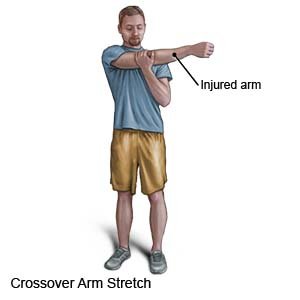
- Back stretch: Lie on your back with your hands behind your head. Bend your knees and turn the lower half of your body to one side. Hold this position for 10 seconds. Repeat 3 times on each side.
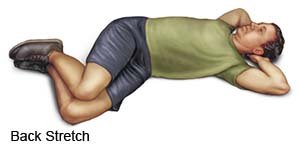
- Hip stretch: Lie on the ground. Place both hands on the shin of 1 leg. Pull your knee toward your chest. Repeat on the other side.
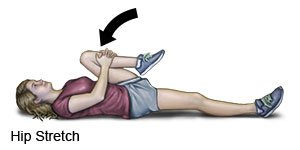
- Standing quadriceps stretch: Stand and place one hand against a wall or hold the back of a chair for balance. With your weight on one leg, bend your other leg and grab your ankle. Pull your heel toward your buttocks.
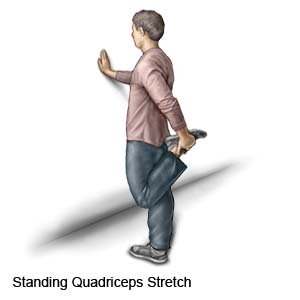
- Standing hamstring stretch: Stand with your feet hips distance apart. Life 1 leg and rest it on a firm surface, such as a table or chair. Keep your toes pointing up. Slide your hands forward along the side of your leg until you feel a stretch. Keep your chest lifted and your back straight. Hold for 30 seconds.
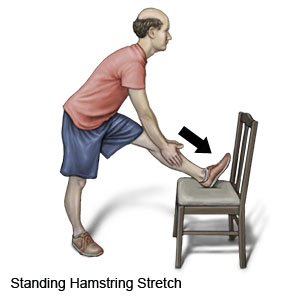
What kinds of activities help improve balance?
Good balance can help you prevent falls. Do balance activities a few times each week. You might want to ask someone to help you while you do these activities. The person can help make sure you do not fall. Make sure your path or activity area is clear of objects before you begin. The following are examples of activities that help improve balance:
- Balance on 1 foot: Hold something sturdy, such as a wall, chair, or walker. Balance your weight on both feet first. Then slowly lift 1 foot off the ground. When you have your balance, you can try letting go of the sturdy object. Make sure it is available for you to hold again if needed. Try to stand on 1 foot for about 10 seconds. Then repeat on the other foot.
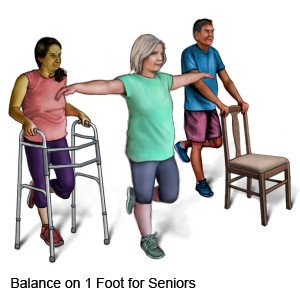
- Walking in a straight line: Put your weight equally on both feet to start. Make sure you have your balance. Then walk forward slowly, putting 1 foot directly in front of the other.
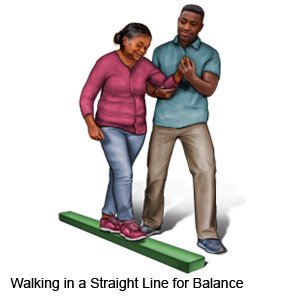
- Walking backward: If no one is available to stand next to you, stand next to a wall. Lean against the wall, and keep your arm on the wall as you walk. Make sure you have your balance. Then walk backward. Go slowly. Make sure you have good balance before you take the next step back.
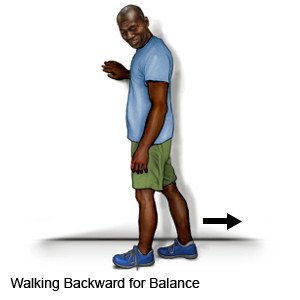
- Tai Chi: Tai Chi combines slow, precise movements with deep breathing and meditation. Classes may be available. An instructor will show you how to do the moves.
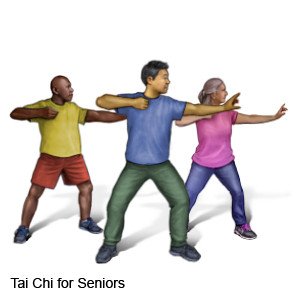
What kinds of activities help improve conditioning?
Conditioning includes activities that increase your heart rate and breathing. Activity that uses body weight is called weightbearing exercise. Examples include walking, dancing, and raking leaves. Weightbearing activities help strengthen bones. Nonweightbearing activities include riding a bicycle and swimming. Aim for 150 to 300 minutes (2.5 to 5 hours) of moderate aerobic activity each week. The following are examples of activities that help improve conditioning:
- Walking: Walking is a good, low-impact exercise. If you are not able to go outdoors, you can still walk in your home. Make sure the walking path in your home is clear and has good lighting. You can also march in place.

- Chair exercises: Chair exercises are a safe way to move if you have balance problems. Sit in a hard chair that has a back. Keep your feet on the ground when you work your arms. Hold the seat or arms of the chair when you work your legs. You can lift weights, use a resistance band, hold an object such as a soup can, or just move your arms and legs. Chair exercise group classes may also be available. An instructor shows you moves to do while you sit in the chair.
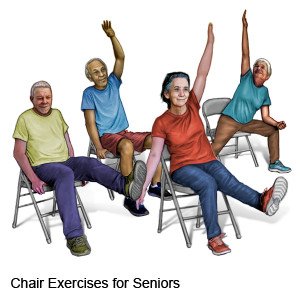
- Water aerobics: Water creates resistance. This means it is harder to move in water than it is on dry ground. Water aerobics can help prevent falls while you exercise. You will raise your heart rate and breathing just by walking along the bottom of the pool through the water. You can also stand in place and work your upper body. Hold pool equipment such as a flotation device or pool noodle to add weight to your activity. Water aerobics group classes may also be available. An instructor shows you moves to do in the water.
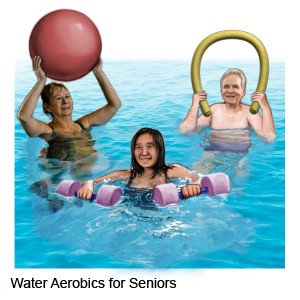
What kinds of activities help build strength?
Strength training helps you keep the muscles you have and build new muscles. Strong muscles help protect your bones. You can also improve your balance by strengthening your leg, back, and core (abdomen) muscles. If you do not have wights or resistance bands, you can use household items, such as soup cans. You can stand or sit in a chair or wheelchair when you do strength training. Try to work all the major muscle groups, such as your legs, arms, abdomen, and chest. Do strength training at least 2 times each week. Spread the days out so you are not doing strength training 2 days in a row. You can cause injury if you do not rest muscles in between sessions. The following are examples of strength training exercises:
- Weightlifting: Start with a weight you can lift easily. You can work up to heavier weights. Do not try to lift heavy weights right away. You might cause a muscle or tendon injury. Repeat each move until you cannot do it even 1 more time. That is 1 set. Do 2 or 3 sets on each area.
- Resistance training: The ends of a resistance band can be held in your hands. You can tie 1 end to a sturdy object. Repeat each move until you cannot do it even 1 more time. That is 1 set. Do 2 or 3 sets on each area.
- Other activities: Work such as digging and shoveling can strengthen muscles. Exercises such as push-ups, sit-ups, or squats can also build muscles.
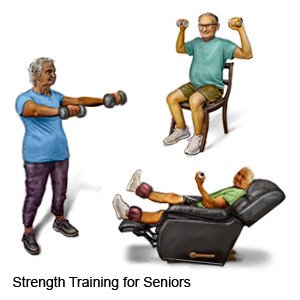 |
What are some tips to help me stay on track?
- Start slowly and work up. You do not have to do all the activity at one time. You can do a few minutes at a time. Remember that some physical activity is better than none. Stand up during the day, even if you cannot walk around. Your body uses more energy when you stand. When you do conditioning activities, aim for a speed that is challenging but not too difficult. You should be able to speak a few words at a time but not be able to sing.
- Plan activities you enjoy. Do a variety of activities so you stay challenged. You do not have to do regular exercises to be active. Walk outdoors, go shopping, or visit a museum. The more you enjoy your activities, the easier it will be to continue doing them.
- Ask for support from the people in your life. Go for a walk after dinner with your family. Meet friends at the park. Find someone who likes the same classes you like. Make plans to attend class together. You may be more likely to go if you know another person is counting on you to be there. Get involved in community events, such as cleaning a community park. Ask someone to help you stay on track. For example, you can tell the person about your daily or weekly activity.
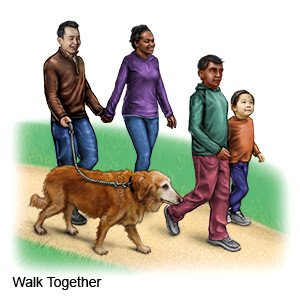
What do I need to know about nutrition and activity?
Healthy foods will give you the energy you need to be active. Activity and good nutrition work together to help you reach or maintain a healthy weight. Healthy foods include fruits, vegetables, lean meats, fish, cooked beans, whole-grain breads, and low-fat dairy products. Your healthcare provider can help you create a healthy meal plan. He or she can tell you how many calories you need to stay active and still lose weight if needed.
 |
When should I call my doctor or physical therapist?
- You have pain with any physical activity.
- You have questions or concerns about physical activity or your health.
Care Agreement
You have the right to help plan your care. Learn about your health condition and how it may be treated. Discuss treatment options with your healthcare providers to decide what care you want to receive. You always have the right to refuse treatment. The above information is an educational aid only. It is not intended as medical advice for individual conditions or treatments. Talk to your doctor, nurse or pharmacist before following any medical regimen to see if it is safe and effective for you.© Copyright Merative 2024 Information is for End User's use only and may not be sold, redistributed or otherwise used for commercial purposes.
Further information
Always consult your healthcare provider to ensure the information displayed on this page applies to your personal circumstances.
